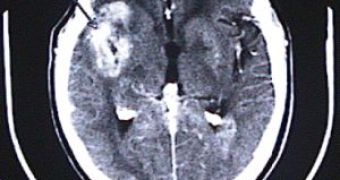People who survive childhood leukemia and brain tumors - the two most common infant cancers - are more prone to strokes later in life, according to the findings of a report published recently in the Journal of Clinical Oncology. The study has been carried out by a team of researchers at the University of Texas Southwestern Medical Center. Moreover, individuals who have been brain tumors patients during childhood and received radiation therapy to treat the cranial tumors have even more increased chances of experiencing strokes 10 to 20 years after.
Leader of the study Dr. Daniel C. Bowers, Associate Professor in Pediatrics at the University of Texas Southwestern Medical School at Dallas stated: "This is the first study to show that childhood leukemia and brain tumor survivors are at an increased risk of stroke. These strokes can occur 10 to 20 years after diagnosis, when most people believe they are no longer at risk for new side effects of treatment, underscoring the need for long-term medical follow-up for childhood cancer survivors."
The team of scientists involved in the current study analyzed data on 6,700 survivors of the two most common forms of infant cancer, out of whom 4,800 suffered from childhood leukemia, while 1,900 were childhood brain tumors survivors. A separate control group included 3,800 of subjects' siblings who had not been afflicted by the fearful conditions.
Overall results of the study showed that 1 in 125 leukemia survivors experienced a stroke event (0.8% of all subjects) as compared to only 1 in 500 (0.2%) of the participants in the control group. The rate of strokes was higher in the brain tumors group, with 1 in 30 (3.4%) cranial tumors survivors who did not receive radiation therapy experiencing an event and 1 in 15 (6.5%) of patients who had been radiation therapy receivers in childhood.
Bowers concluded that people who had been leukemia or brain tumors patients back in childhood should not live under the wrong impression that once the fearful conditions are cured they are no longer at risk of strokes and other health disorders such as heart problems, obesity, hormone deficiency, neurocognitive problems, secondary cancers etc.
"Many people think, 'You're five years out from your cancer, you must be cured, and you can get on with the rest of your life.' But these patients suddenly develop a new complication of the cancer and its treatments." It is important for survivors and their doctors to know that the impact of some of these long-term effects can be reduced through careful follow-up screening and care, and education to help survivors stay healthy long after their treatment has ended."

 14 DAY TRIAL //
14 DAY TRIAL //